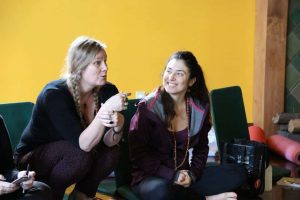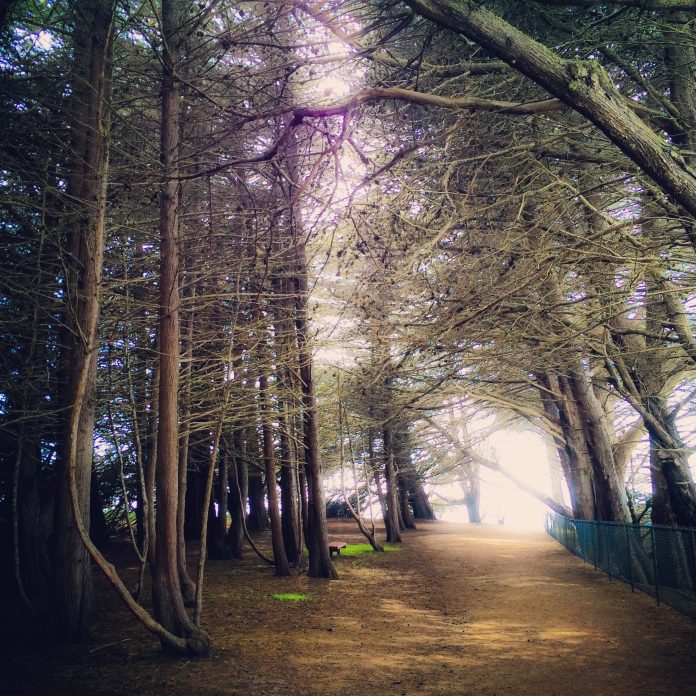By Mary Petiet
On Monday my movements were shadowed by crows. A murder of them swooped along as I drove down the street, and one came straight at me, nearly hitting my windshield, a kamikaze crow playing crow chicken.
A murder of crows is a flock, and if you’re ever plagued by one, it might be trying to tell you something.
On Tuesday I was confronted by an insistent single crow on the beach. It landed on the sand five feet in front of me and proceeded to engage me in vigorous crow talk as it edged a little closer, a little closer, and a little closer before finally taking flight, circling my head once and vanishing into the sun.
Crows are the messengers of change and death.
On Wednesday afternoon my Aunt Lisa died suddenly and the crows were gone.
The last time I saw my aunt I was in traffic behind her. When the lights changed I turned left towards the harbor while she proceeded straight. She drove one of the few remaining proper station wagons, not a cross-over, but a silver Mercedes four door wagon, styled like what we all used to drive before cross-overs and mini-vans ruled the roadways.
She headed east, and now I imagine her following the historic Old King’s Highway to its conclusion at the easternmost point of Cape Cod, the edge of America, the spot on the far side of the Cape’s tip in the oceanic wilds beyond the colorful cacophony of Ptown. The spot where Thoreau said you can stand and put all America behind you.
From here, any progress further east is blocked by water.
I imagine her on the edge of the ocean, the surf pounding and the blue of the water losing itself in the blue of the horizon, and it would have been so easy for her to slip into the depths and dissolve into the ephemeral nothingness of the blue fluidity.
Instead she checked herself into a Boston hospital with chest pain, was admitted to the cardiac unit, and declared dead of a massive heart attack within the hour.
Growing up my aunt’s house was a short path through the woods from mine. The path wound through trees, passed a daisy field, and followed a bridge over a stream. It was an ancient way, and it traced the old Indian Trail past colonial stone walls and bottle dumps my aunt would excavate. It connected our houses and we called it the Psychopath.
I would follow the Psychopath to visit her and she would make elegant tea parties with Red Rose tea. She always called me Muffin, and she taught me to arrange flowers, find clams on the flats, and how to make tuna fish sandwiches. We’d spread the tuna on Pepperidge farm bread and have gold fish crackers with seven-up for lunch.
When my mother took her first tentative steps back into the work force, I would follow the Psychopath to my aunt’s house on school mornings, and my aunt would give me breakfast and put me on the bus, and she was always home when the bus dropped me off again at the end of the day. When I needed her, she was a second mother to me.
She was 70 when she died, the first leaf to fall from the tree directly above me, jolting my cousins and me with the realization that we are now the grownups, and jolting her own generation with a deeper insistence of its own mortality.
I hadn’t seen her in some time. She had unmoored from the old ties and I had been distracted by my own children, for whom I now make tuna fish and meet the school bus. Other people occupy our old houses, and the Psychopath is overgrown. I never thought of her as old, and there was never any feeling of urgency to the idea that we should connect.
She left quietly through the back door, and never got to say goodbye.
I imagine her young and tall and blonde and statuesque. She loved the ocean, was a strong sportswoman, and she effortlessly sported those iconic American good looks Ralph Lauren tries so hard to capture.
A week later my best friend died.
The evening before his diagnoses, a pair of peacocks roosted in the maple outside my back door. Crows are not a rarity here, but peacocks are unheard of, and the near Technicolor hue of their necks lent meaning to the concept of peacock blue. They perched there silently, made large by their dangling plumage.
The peacock is phoenix-like in aspect, and is said to symbolize rebirth and transcendence, and is death not the ultimate transcendence?
The next morning dawned with the knowledge that it was time to bring our rapidly declining black and white cat Faust to the vet. The peacocks stayed until well after sunrise, sitting vigil for Faust. I missed their departure meeting deadlines as I tried to get Faust examined.
He was diagnosed with a myriad of symptoms. He was dying of old age and suffering badly in the process. We knew his time had come, so we scheduled the appropriate appointment for the following morning.
This meant letting go of a dear friend, and I call him my best friend because he was more dog then cat, he was always with me, always at my feet or in my lap. Right now I am re-learning how to write because there is no softly purring presence sleeping against my left arm as I tap the keys.
It is hard now to discount the old traditions, symbols and omen. There is something to the ancient idea that information can travel on the currents of energy circling the world to manifest in subtle, easy to miss hints. Everything is connected and everything holds a space.
There has been an especial starkness to these first two weeks of April on the tail end of a horrendous Northeast winter. The seasons change, the earth tilts, and each death both takes something with it and leaves something else behind.
Lisa, the suddenly lost aunt I knew from day one, helped me grow and was of my childhood. Her absence places that time a little bit further from reach, and leaves me to grow more as her generation moves forward and my generation continues to somehow assume the mantle of true adulthood, in the space between our children and our parents. We are sandwiched in the middle and we are holding the space so each can grow, the younger to maturity and the older to whatever comes next beyond this mortal coil.
When we arranged the flowers Lisa grew, we brought beauty inside to illuminate our interior spaces. When she taught me to dig clams, extracting delicious beautifully packaged morsels from the mud, she showed me how to find beauty in dark places, and when we fueled all of this with shared tuna fish sandwiches, we were tapping into strength and nourishing community.
Faust, the suddenly absent cat we acquired fifteen years ago in the bright days leading up to 9/11, was the starter child my husband and I added to the wonderfully ramshackle Cape starter house we’d just moved into.
Faust was what remained of us from those halcyon years before airplanes flew into the World Trade Center and the tech bubble crashed, when the world was truly our oyster and we were just starting to think about having children.
So we treated Faust like a child, and he became a true family member, always present with a happy greeting. He was our first parenting experience, preparing us for the children we now have, and his declining old age may help ready us for the inevitable fading of my parent’s generation.
We buried him in the rain at the foot of the maple tree. The air was finally alive with spring as we worked through clumps of blooming snowdrops and struggled deeper through roots and stones and unyielding clay. As we finally placed him in the wet, dark earth, I thought I heard Aunt Lisa’s voice calling on the wind across the low tidal flats, “Don’t worry Muffin, I went first to check it out!”
A crow cawed high above, heading north out over the water and there was no sign of the peacocks. Their vigil had ended and they had vanished as fully and silently as the cat when his soul slipped from his body.
Mary Petiet (www.marypetiet.com) writes about current events, organic farming, local food, history and spirituality. She is a long time contributor to Edible Cape Cod Magazine, a reporter for the Enterprise Newspapers, and her work has been featured in Parent Co. Look for her upcoming article in STIR Journal, and her book Minerva’s Owls, which reinterprets old stories in new ways to create a new future from Homebound Publications, April, 2017. Follow her on Facebook or twitter @maryblairpetiet.



To get into your words and stories? Join Jen Pastiloff and best-selling author Lidia Yuknavitch over Labor Day weekend 2015 for their 2nd Writing & The Body Retreat in Ojai, California following their last one, which sold out in 48 hours. You do NOT have to be a writer or a yogi.
“So I’ve finally figured out how to describe Jen Pastiloff’s Writing and the Body yoga retreat with Lidia Yuknavitch. It’s story-letting, like blood-letting but more medically accurate: Bleed out the stories that hold you down, get held in the telling by a roomful of amazing women whose stories gut you, guide you. Move them through your body with poses, music, Jen’s booming voice, Lidia’s literary I’m-not-sorry. Write renewed, truthful. Float-stumble home. Keep writing.” ~ Pema Rocker, attendee of Writing & The Body Feb 2015
Featured image by Tiffany Lucero.

This was written beautifully. You words took me right to the scene and places in your heart. Thank you for sharing.